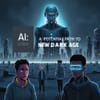The rapid advancement of artificial intelligence (AI) is raising concerns about its impact on human knowledge and society. Some experts warn that our increasing reliance on AI could lead to a decline in critical thinking and intellectual abilities, potentially ushering in a new era of intellectual darkness.
Historically, the invention of the printing press and the rise of literacy rates marked significant milestones in human progress. However, the proliferation of AI-generated content and our growing dependence on technology may be having the opposite effect. By outsourcing our cognitive functions to machines, we risk losing the ability to think deeply and critically.
The consequences of this trend could be far-reaching. As AI-generated content floods the internet, it may become increasingly difficult to distinguish fact from fiction. This could lead to a decline in the quality of information and a loss of trust in institutions. Furthermore, our reliance on AI could also erode our ability to perform basic cognitive tasks, making us vulnerable to technological failures and manipulation.
To mitigate these risks, it is essential to strike a balance between harnessing the benefits of AI and preserving human intellectual capabilities. By promoting critical thinking, media literacy, and intellectual curiosity, we can ensure that AI enhances human knowledge and understanding rather than undermining it. Ultimately, the future of human knowledge and society depends on our ability to wield AI in a way that complements our humanity.


